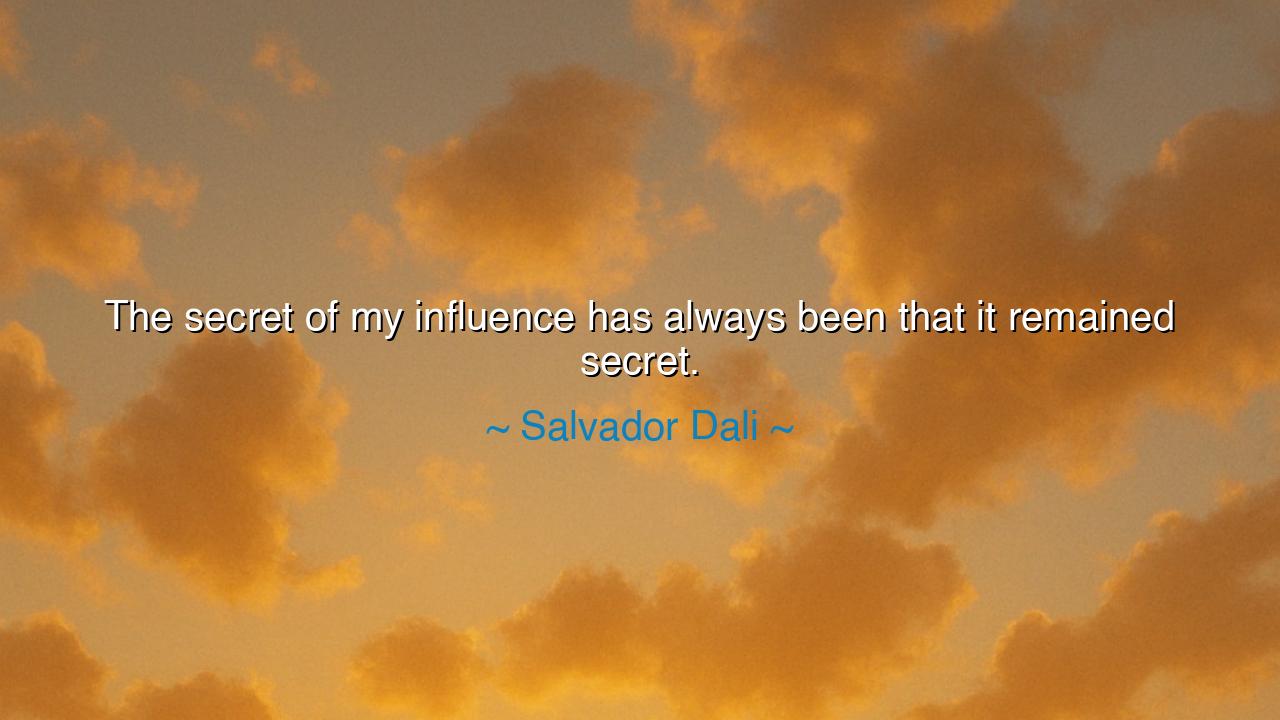
The secret of my influence has always been that it remained






The brilliant and enigmatic artist Salvador Dali, master of the surreal, once uttered a riddle-like truth: “The secret of my influence has always been that it remained secret.” These words shimmer like a mirage, revealing the mysterious nature of power and inspiration. Dali teaches that true influence does not shout its presence or reveal its workings. Instead, it moves unseen, shaping thoughts, emotions, and actions like the silent wind that bends mighty trees without being seen itself.
Influence, when openly displayed, invites resistance. When one declares, “I control you,” the spirit of the other rebels. But when influence remains hidden, it weaves itself into the fabric of the mind, guiding without force, inspiring without command. This is the art of subtlety, known to sages and rulers alike. Dali understood that his strange persona, his wild visions, and his unpredictable behavior created ripples in the world precisely because no one could fully grasp his intent. By guarding the secret, he allowed imagination itself to do the work.
History offers many examples of this principle. Consider the rise of Mahatma Gandhi. Though he led millions in a struggle for independence, he never declared himself a ruler or a tyrant. His influence came not from the throne but from the silent strength of his actions and ideals. The British Empire could not fully combat his power because it did not come from armies or decrees but from hearts and minds. His secret lay in humility and discipline, forces invisible yet irresistible.
Even in the darker realms of history, hidden influence has shaped events. During the Cold War, spies and unseen networks altered the course of nations. Their actions remained cloaked in secrecy, and for decades, the full extent of their influence was unknown. Power that moves unseen often proves more enduring than power that declares itself openly. Like shadows, it operates in silence, yet its effect is undeniable.
Let this teaching be etched into the scrolls of wisdom: do not always reveal the depth of your power or the reach of your influence. The greatest leaders, artists, and thinkers understand that mystery captivates the human soul. When your true methods remain hidden, your work gains a life of its own, spreading further than direct control ever could. For in the dance between secrecy and revelation lies the essence of mastery. As Dali himself knew, the secret of influence is most potent when it dwells forever in the realm of the unseen.






ABMinh anh Bui
There’s something paradoxical about this statement that I love. It suggests that mystery itself is a kind of influence—that the less you reveal, the more people project their own fascination onto you. Dali was a master of that. But it also raises a question: is secrecy necessary for greatness, or is it just another performance? Maybe some of the most powerful figures are those who keep their motives hidden.
NMNgoc Mgocj
This quote makes me think about the psychology of influence. Maybe Dali is saying that the most effective persuasion doesn’t announce itself. When people feel influenced without realizing it, the effect is more lasting. It reminds me of how some art, ideas, or people change us quietly, beneath the surface. Do you think influence works best when it’s invisible, or is transparency more ethical in the modern world?
KDLe Thi Kieu Diem
I find this statement fascinating because it plays with the idea of mystery as power. Dali seemed to understand that charisma often thrives on ambiguity. When you can’t quite define why someone captivates you, their influence grows even stronger. But I’m curious—was he being sincere or ironic? Perhaps he’s suggesting that self-awareness about influence destroys it, turning something organic into mere manipulation.
GLNguyen Gia Linh
This quote feels so perfectly Dali—mysterious, ironic, and self-aware. It makes me think about how influence loses its magic once it’s explained or exposed. Maybe he’s hinting that true impact comes from subtlety, from the unseen forces that shape people without them realizing it. I wonder if this applies to all kinds of influence—artistic, social, or personal. Does revealing your method diminish its power?